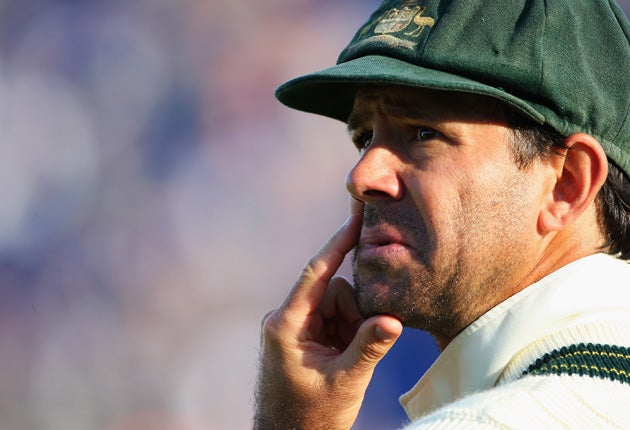Australian angle: Ponting knows McGrath would have got it done

Your support helps us to tell the story
From reproductive rights to climate change to Big Tech, The Independent is on the ground when the story is developing. Whether it's investigating the financials of Elon Musk's pro-Trump PAC or producing our latest documentary, 'The A Word', which shines a light on the American women fighting for reproductive rights, we know how important it is to parse out the facts from the messaging.
At such a critical moment in US history, we need reporters on the ground. Your donation allows us to keep sending journalists to speak to both sides of the story.
The Independent is trusted by Americans across the entire political spectrum. And unlike many other quality news outlets, we choose not to lock Americans out of our reporting and analysis with paywalls. We believe quality journalism should be available to everyone, paid for by those who can afford it.
Your support makes all the difference.Although they came extremely close on a thrilling last day, the Australians were unable to take the eight wickets needed to secure victory on a soporific Sophia Gardens pitch. A runout was missed, a few appeals rent the air but in the end the home team escaped the noose. Victory does not always go to the deserving. Rather it must be grabbed by the ambitious, seized by the hungry and retained by the desperate.
Australia were not quite good enough. Ricky Ponting and company toiled tirelessly but were unable to shift Paul Collingwood, a batsman of high character relishing the dogfight. And when this stubborn foe was finally removed the tailenders clung to the crease with a tenacity befitting the occasion. Monty Panesar did a fair impersonation of Trevor Bailey as he thwarted the Aussies. Not that he was called upon to face the most dangerous bowlers.
Glenn McGrath and Shane Warne were past masters at winkling out opponents on the fifth day, so much so that captains often did not enforce the follow-on. McGrath had an even better record than his barley-headed comrade in the fourth innings. His ability to hammer away on a length and to exploit low bounce served as a reminder that pace bowlers have roles to play towards the end of long matches. Uneven bounce presents a bigger problem to batsmen than sharp turn. As English cricket cannot remain in a 2005 reverie, though, these visitors cannot hark back to yesterday's champions. Except in helpful conditions, Australia are going to need a lot more time to take wickets.
As much was obvious in Cardiff. At various times the Australians appeared to be on the verge of victory only to encounter more dogged resistance. Kevin Pietersen's early dismissal seemed to indicate a doomed state of mind and to consign the hosts to defeat. Andrew Strauss's departure left England with only one batsman with the focus and skill needed to bat the rest of the day. But England bat a long way down and the pitch was dead.
Towards the end, Ponting did not make the best use of his bowlers, showing undue faith in Mitchell Johnson, too little in Ben Hilfenhaus and inexplicably relying on Marcus North in the last 15 minutes. Overall the bowlers served him well. Hilfenhaus continued to swerve the ball, and was the only paceman on either side to pose a consistent threat. Bafflingly, he was not given the ball in the last hour. Peter Siddle produced his best and fiercest spells of the match on the final afternoon and likewise might have seen more of the ball in the denouement.
But Johnson's loss of form was a serious blow to a limited strike force. Had he been able to produce even remotely his best, the match could not have outlasted tea. After all he is the key man in the modern Australian attack. His arm was low and he did not swing the ball or attack the stumps with sufficient hostility. From over the wicket almost every delivery was directed wide of the sticks. He was a bit more dangerous from around, but not much. Experts watching him for the first time concluded he had been over-hyped, and not without reason. Certainly he was a shadow of the bowler last seen in Cape Town, an operator capable of cracking heads and unleashing late swing.
Nathan Hauritz performed above expectations. No-one, least of all the genial Queenslander, casts him as a destructive Test tweaker. Lacking a deadly delivery, unable to bowl a heavy ball, his strength lay in his control, variation and flight. During the course of a long and frustrating day he hardly bowled a bad ball. But Warne used to rip the tops off bottles. Hauritz politely removes the cap. Although he troubled the left-handers, their orthodox brethren were able to keep him out. He bowled well but could not quite finish the job.
And so the teams go to Lord's all square. History will record Australia's superiority, reporters will remark upon it, but otherwise it matters not a jot.
Join our commenting forum
Join thought-provoking conversations, follow other Independent readers and see their replies
Comments